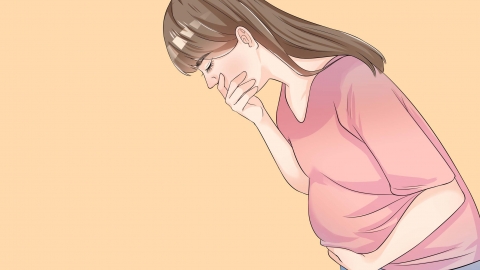Why does nausea return during the second trimester after it had stopped, and what should be done about it?
Generally, if nausea and vomiting reappear during the second trimester after having previously subsided, it may be due to hormonal fluctuations, improper diet, gastroenteritis during pregnancy, gastroesophageal reflux disease (GERD), or intrahepatic cholestasis of pregnancy. It is recommended to seek medical attention promptly, identify the underlying cause, and then improve symptoms under a doctor's guidance through general management, medication, and other approaches. Specific analyses are as follows:

1. Hormonal fluctuations: Changes in placental function during mid-pregnancy may lead to temporary increases in estrogen and progesterone levels, which can stimulate the gastrointestinal mucosa and cause recurrent vomiting. Eating small, frequent meals and choosing light, easily digestible foods such as soda crackers and steamed buns can help. Avoiding an empty stomach or overeating, and remaining upright for at least half an hour after meals, can reduce gastrointestinal burden.
2. Improper diet: Consuming spicy, greasy, raw, or cold foods may加重 the digestive load on the gastrointestinal tract, leading to nausea and vomiting. Adjust the diet immediately, focusing on warm, soft, and finely textured foods. Drink plenty of warm water and consume fruits such as apples and bananas in moderation to help regulate gastrointestinal function.
3. Gastroenteritis during pregnancy: Poor hygiene in food intake may lead to bacterial infection of the gastrointestinal tract, manifesting as vomiting, bloating, and diarrhea. Follow medical advice to use medications such as Bifidobacterium triple viable powder, montmorillonite powder, and oral rehydration salts III to replenish fluids and electrolytes, restore intestinal flora balance, and prevent dehydration.
4. Gastroesophageal reflux disease (GERD): Enlargement of the uterus may compress the stomach, causing gastric acid to reflux into the esophagus and trigger vomiting accompanied by heartburn. Light walking after meals can aid digestion. When sleeping, elevate the upper body by 15–30 degrees. Follow medical instructions to use medications such as hydrotalcite chewable tablets, sodium bicarbonate tablets, or omeprazole enteric-coated capsules to relieve symptoms.
5. Intrahepatic cholestasis of pregnancy: Abnormal bile acid metabolism can irritate the gastrointestinal tract, resulting in symptoms such as vomiting and skin itching. Under medical guidance, use medications like ursodeoxycholic acid capsules, ademetionine disulfate tosylate enteric-coated tablets, and vitamin C tablets to lower bile acid levels and protect liver function.
In daily life, maintain a positive mood and avoid stress or anxiety. Pay attention to food hygiene and ensure all ingredients are thoroughly cooked before consumption. Wear loose, comfortable clothing to avoid abdominal pressure. Through scientific care and management, alleviate vomiting symptoms and safeguard maternal and fetal health.







